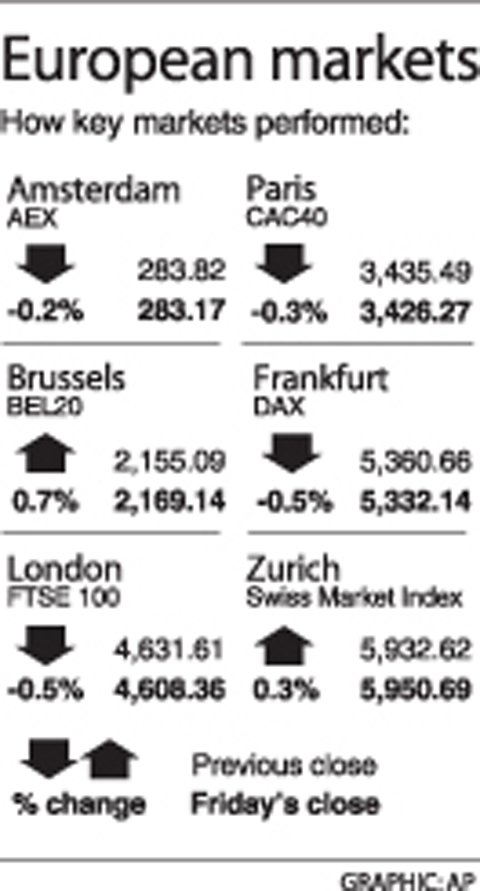European stocks rallied for a third consecutive week as companies from Bayer AG to Banco Bilbao Vizcaya Argentaria SA and BT Group PLC reported earnings that beat analysts’ estimates.
Bayer, Germany’ largest drugmaker, rose 7.2 percent after cost cuts at its plastic unit helped second-quarter profit.
BBVA, Spain’s second-biggest lender, climbed 15 percent, while and Akzo Nobel NV advanced more than 9 percent.

About 60 companies posted better-than-projected net income this week, according to Bloomberg data.
The STOXX 600 added 2.4 percent to 224.91, near the highest level since November, as all 19 industry groups increased except oil and gas companies. The benchmark index for European equities climbed 9.3 percent last month, bringing the rebound from a 12-year low on March 9 to 42 percent.
“While companies’ sales show the crisis is here, they have managed to cut costs and help income in a quick and preventive way,” said Juan Carlos Acitores, who helps oversee about US$20 billion at Ahorro Corporacion Gestion in Madrid.
“Since the fear of a 1930s-style recession is behind us, it does not pay to have your money in the bank while some stocks pay several times more in dividends,” Acitores said.
Earnings at more than half of STOXX 600 companies that have reported results since July 8 beat predictions, according to Bloomberg data, with profits shrinking 33 percent on average. Net income exceeded estimates by an average of 22 percent, while sales were almost in line with projections, exceeding them by 0.9 percent. For the full year, analysts expect 7.1 percent profit growth, estimates compiled by Bloomberg show.
The three-week rally has pushed valuations in the STOXX 600 to about 33 times its companies’ past earnings, the highest level since January 2004, according to Bloomberg data. This compares with a valuation of 14.2 times projected profits.
National benchmark indexes rose in all 18 western European markets this week, except Ireland. Germany’s DAX gained 2 percent, while France’s CAC 40 climbed 1.8 percent. The UK’s FTSE 100 added 0.7 percent.

LONG FLIGHT: The jets would be flown by US pilots, with Taiwanese copilots in the two-seat F-16D variant to help familiarize them with the aircraft, the source said The US is expected to fly 10 Lockheed Martin F-16C/D Block 70/72 jets to Taiwan over the coming months to fulfill a long-awaited order of 66 aircraft, a defense official said yesterday. Word that the first batch of the jets would be delivered soon was welcome news to Taiwan, which has become concerned about delays in the delivery of US arms amid rising military tensions with China. Speaking on condition of anonymity, the official said the initial tranche of the nation’s F-16s are rolling off assembly lines in the US and would be flown under their own power to Taiwan by way

CHIP WAR: The new restrictions are expected to cut off China’s access to Taiwan’s technologies, materials and equipment essential to building AI semiconductors Taiwan has blacklisted Huawei Technologies Co (華為) and Semiconductor Manufacturing International Corp (SMIC, 中芯), dealing another major blow to the two companies spearheading China’s efforts to develop cutting-edge artificial intelligence (AI) chip technologies. The Ministry of Economic Affairs’ International Trade Administration has included Huawei, SMIC and several of their subsidiaries in an update of its so-called strategic high-tech commodities entity list, the latest version on its Web site showed on Saturday. It did not publicly announce the change. Other entities on the list include organizations such as the Taliban and al-Qaeda, as well as companies in China, Iran and elsewhere. Local companies need

CRITICISM: It is generally accepted that the Straits Forum is a CCP ‘united front’ platform, and anyone attending should maintain Taiwan’s dignity, the council said The Mainland Affairs Council (MAC) yesterday said it deeply regrets that former president Ma Ying-jeou (馬英九) echoed the Chinese Communist Party’s (CCP) “one China” principle and “united front” tactics by telling the Straits Forum that Taiwanese yearn for both sides of the Taiwan Strait to move toward “peace” and “integration.” The 17th annual Straits Forum yesterday opened in Xiamen, China, and while the Chinese Nationalist Party’s (KMT) local government heads were absent for the first time in 17 years, Ma attended the forum as “former KMT chairperson” and met with Chinese People’s Political Consultative Conference Chairman Wang Huning (王滬寧). Wang

OBJECTS AT SEA: Satellites with synthetic-aperture radar could aid in the detection of small Chinese boats attempting to illegally enter Taiwan, the space agency head said Taiwan aims to send the nation’s first low Earth orbit (LEO) satellite into space in 2027, while the first Formosat-8 and Formosat-9 spacecraft are to be launched in October and 2028 respectively, the National Science and Technology Council said yesterday. The council laid out its space development plan in a report reviewed by members of the legislature’s Education and Culture Committee. Six LEO satellites would be produced in the initial phase, with the first one, the B5G-1A, scheduled to be launched in 2027, the council said in the report. Regarding the second satellite, the B5G-1B, the government plans to work with private contractors